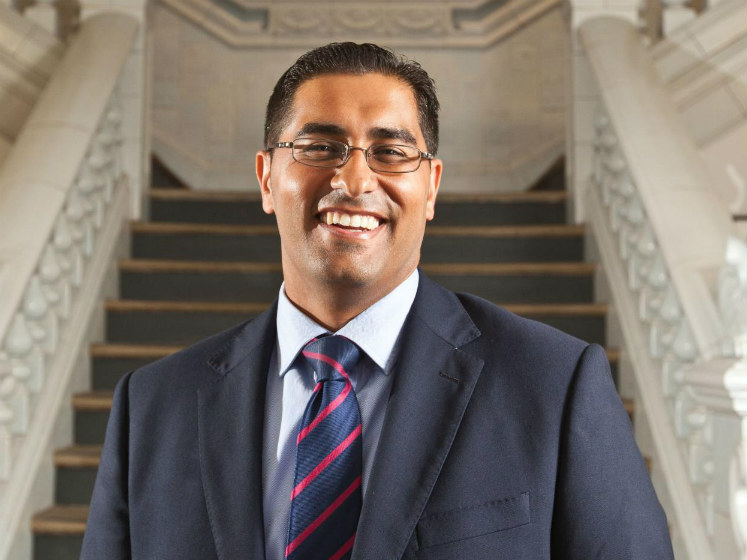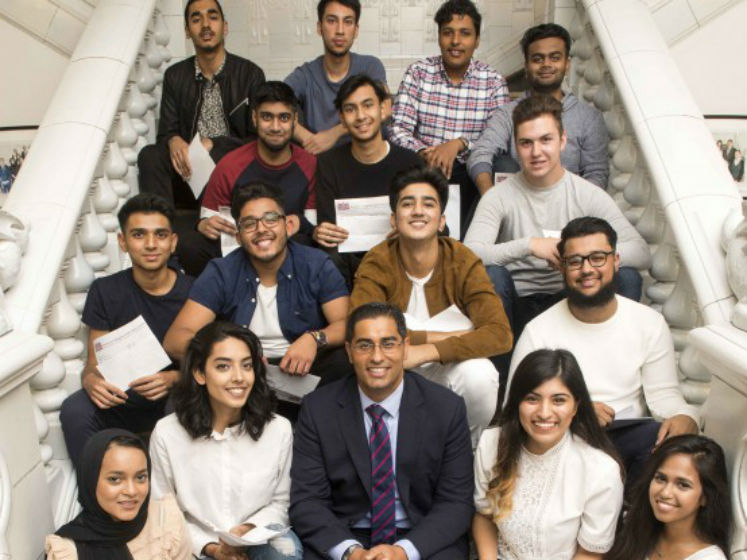 LSE alumnus Mouhssin Ismail
LSE alumnus Mouhssin Ismail
You gave up our job as a city lawyer to become head teacher at London’s Newham Collegiate Sixth Form. What prompted you to make this unusual career move?
The simple answer is social mobility. Having been educated in a state comprehensive school in Ilford, East London, and with parents and a family network who valued education, I always aspired to study at a world class university and become a lawyer.
However, when I began practising law in a City firm I realised that there was a dearth of students from a similar background to me. There wasn’t a lack of talent where I grew up – in fact, there were many able students – but their circumstances precluded them from accessing some of these top institutions and enjoying the benefits that being a city lawyer gives you.
Newham may be one of London’s poorest boroughs but it’s important to remember that there isn’t a poverty of ambition among the students and their parents. We all genuinely believe in this radical but basic notion that irrespective of your background everyone deserves a first-class education.
To return to your question, my career move wasn’t just about getting young people from low-income backgrounds into university; I wanted the students in my care to believe that it is possible for them to attend any top university, and to know they can be and do whatever they put their minds to.
Last year, your school managed to send 95% of pupils to top universities. What measures were put in place to achieve such good results?
We have extremely high expectations: teachers plan and deliver lessons that consistently stretch and challenge students. Getting it right in the classroom is an absolute must, as without strong A-level grades our students won’t be able to access the most competitive universities in the UK and abroad. But more than that, we provide experiences beyond the curriculum to elevate our students’ thinking.
We want our students to have the same opportunities that a fee paying independent school provides, so I have arranged for work placements with an international law firm in Abu Dhabi and Dubai as well London, science placements in Japan with the help of the Clifton Scientific Trust, and visits to Washington and New York. We have also managed to attract high profile guest speakers to give lectures exposing our students to high level intellectual discourse and created podcasts to share the educational experience with others, hoping they too would be inspired.
Forming strategic partnerships with Russel Group Universities has helped immensely and, for those students who aspire to study at a top US university, we provide assistance with the ACT or SATs and interview preparation, attaching a mentor who has studied at an Ivy League University for additional advice and guidance.
 LSE alumni Mouhssin Ismail with students. Image credit: Newham Collegiate Sixth Form
LSE alumni Mouhssin Ismail with students. Image credit: Newham Collegiate Sixth Form
What are the main challenges and concerns for school leaders today?
Funding. All schools need sufficient resources to be able to provide an education that is fit for purpose, without having to think about how to rationalise on learning and teaching. If you are serious about social mobility, then the case for adequately funding schools in areas of deprivation is even stronger, and if we fail to invest in our young people now the long-term consequences are severe.
Teacher recruitment and retention is another key concern, especially in subjects such as the sciences and mathematics, and there is a real need for governments to think creatively about how to attract the best graduates into the teaching profession – and not lose them once they have trained and spent several years honing their skills.
Last but not least, the changes to the curriculum at Key Stage 4 (KS4) and KS5 are welcome as they add more rigour and challenge, but the haste with which they have been implemented has caused immense anxiety in schools for our young people and teachers.
How can universities help widen access to higher education and increase their intake of students from underrepresented backgrounds?
Universities already do a fantastic job in widening participation for students from underrepresented groups: from all the masterclasses, academic lectures and summer schools to UCAS support and admission test preparations, there is a real plethora of high quality opportunities available to young people.
I also welcome the move by some universities to introduce a foundation year for some of the more competitive degrees, as these really help some students who are bright and able from underprivileged backgrounds who may need an extra year studying to close the gap.
The real challenge is to raise aspirations of students at a very young age, to make the case that attending university and getting a degree is life changing for them and their families.
Visits to universities and small group sessions for students as they move through secondary school are all excellent initiatives and I also think mentoring plays a big role – having someone who comes from a similar background and understands the challenges but has nonetheless surmounted these obstacles does inspire young people.
This interview was conducted in 2018